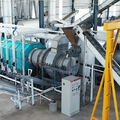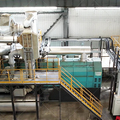Coconut shells, often considered mere byproducts of the coconut industry, possess immense untapped potential. The conversion of coconut shells into charcoal is a sustainable and eco-friendly process that not only addresses waste management concerns but also yields a valuable resource. In this comprehensive guide, we explore the various facets of the conversion process, its applications, and the environmental benefits it brings.

1. The Coconut Shell: A Valuable Biomass Resource:
a. Abundance and Accessibility:
- Coconut shells are readily available as a byproduct of coconut processing.
- Abundant in tropical regions, these shells are often discarded or underutilized.
b. Physical Properties:
- Hard and dense composition makes coconut shells an ideal candidate for charcoal production.
- High carbon content and low moisture content contribute to efficient combustion.
2. Charcoal Production Methods:
a. Traditional Kiln Method:
- Involves stacking coconut shells in a kiln and heating in the absence of air.
- Requires careful monitoring of temperature and air supply.
- Yields high-quality charcoal but may have environmental drawbacks.
b. Mechanical Carbonization:
- Modern methods involve using coconut charcoal machine like pyrolysis reactors.
- Controlled conditions ensure efficient carbonization.
- Reduces emissions and increases production efficiency.
c. Pyrolysis Technology:
- Involves heating coconut shells in the absence of oxygen, converting them into charcoal.
- Pyrolysis reactors offer a controlled environment for the process.
- Provides a more sustainable and energy-efficient approach.
3. Steps in Coconut Shell to Charcoal Conversion:
a. Preparation of Coconut Shells:
- Shells are collected, cleaned, and broken into smaller pieces for uniform carbonization.
- Drying the shells reduces moisture content, enhancing the efficiency of the conversion process.
b. Loading the Pyrolysis Reactor:
- Coconut shells are loaded into the pyrolysis reactor.
- The reactor creates an oxygen-free environment for the thermal decomposition of the shells.
c. Carbonization Process:
- Controlled heating initiates the pyrolysis process.
- Organic compounds in the coconut shells break down, leaving behind charcoal.
d. Cooling and Collection:
- The produced charcoal is then cooled and collected.
- Further processing may include grading and packaging.
4. Applications of Coconut Shell Charcoal:
a. Cooking Fuel:
- Coconut shell charcoal is an excellent fuel for cooking, providing a clean and efficient energy source.
- Widely used in households and restaurants.
b. Industrial Processes:
- Coconut shell charcoal finds applications in various industrial processes, such as metal smelting and production of activated carbon.
- Its high calorific value makes it a preferred choice.
c. Agricultural Sector:
- Used as a soil conditioner, coconut shell charcoal improves soil structure and fertility.
- Enhances water retention and nutrient absorption in agricultural practices.
d. Water Purification:
- Activated carbon derived from coconut shell charcoal is effective in water purification.
- Removes impurities and contaminants, making it a valuable resource in water treatment.

5. Environmental Benefits:
a. Waste Reduction:
- Converts coconut shells, which would otherwise be waste, into a valuable product.
- Addresses the issue of coconut shell disposal and landfill utilization.
b. Carbon Sequestration:
- The process of converting coconut shells into charcoal helps sequester carbon.
- Charcoal can be used for long-term carbon storage in soil.
c. Renewable Resource:
- Coconut shells are a renewable resource, and their conversion into charcoal aligns with sustainable practices.
- Reduces dependence on traditional wood charcoal.
6. Challenges and Considerations:
a. Economic Viability:
- The economic feasibility of coconut shell charcoal production depends on market demand and production costs.
- Exploring value-added products can enhance profitability.
b. Technology Adoption:
- Traditional methods may face challenges in terms of efficiency and environmental impact.
- Adoption of modern pyrolysis technology requires investment and awareness.
c. Quality Control:
- Ensuring consistent quality of coconut shell charcoal is crucial for market acceptance.
- Strict quality control measures are essential in the production process.
7. Innovations and Future Prospects:
a. Technological Advancements:
- Ongoing research aims at improving pyrolysis technology for higher efficiency.
- Integration with other technologies, such as gasification, presents opportunities for innovation.
b. Product Diversification:
- Exploring new applications and value-added products derived from coconut shell charcoal.
- Developing niche markets for specialized charcoal products.
c. Community Empowerment:
- Encouraging local communities to participate in the production process, fostering sustainable development.
- Community-based enterprises can contribute to economic growth.
Conclusion:
The conversion of coconut shells into charcoal epitomizes the synergy between environmental sustainability and economic viability. From cooking fuel to water purification, the applications of coconut shell charcoal are diverse and impactful. As we navigate the challenges and embrace innovations, the journey from discarded coconut shells to valuable charcoal unfolds, contributing not only to waste reduction but also to the creation of a sustainable and resource-efficient future. The coconut, once seen as a symbol of tropical indulgence, now stands as a beacon of sustainable progress through the transformation of its humble shell into a valuable source of energy and enrichment for communities worldwide.




